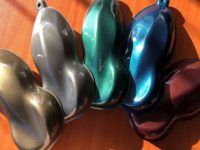
Larry Crawley, global technology director for DuPont Herberts Automotive Systems, continued the international flavor as his opening paper presented technical trends gathered from 30 major automotive manufacturers worldwide. The industry seeks a shorter, more efficient painting process with less investment and shorter process times. The challenge is to reduce thermal cure cycle times, bake temperature and the footprint of the finishing line while complying with environmental standards and continuing the drive for superior aesthetic value that will endure the life of the car (noting that "Hyundai has set a high bar with its 100,000 mile, ten year warranty"). Dr. Crawley sees a long-term move to consolidate waterborne primer and basecoat applied wet-on-wet to eliminate one set of ovens while the top clear coat will likely remain solvent borne. He also expects larger palettes of color, noting that today's fashion runway colors will determine tomorrow's automotive colors.
Thirty other presentations were far ranging and included papers on corrosion inhibitors, photocatalytic coatings, nanomaterials, renewable (agriculture-based) latexes, surfactants and accelerated testing. Eastman Chemicals, Bayer Material Science, DuPont Performance Coatings and Noveon provided social opportunities for comparing notes and renewing friendships.
The prescience of the Polymers Department of the University of Southern Mississippi in creating this conference a full four years before EPA began to focus the nation's attention on low solvent coatings continues to be a mystery to Jim Berry, a charter member of that first EPA's coatings group and writer of this report.
Make plans to attend the symposium next year, watch the parades, and plead for beads. Visit www.psrc.usm.edu/waterborne for more information.



